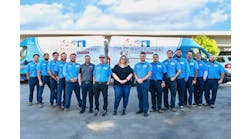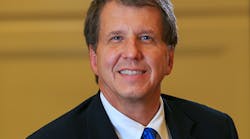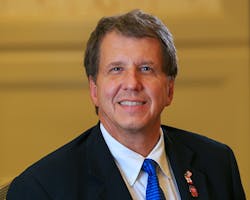FALLS CHURCH, VA. — As CONNECT 2015 kicks off Sept. 30 – Oct. 2 in Hollywood, Fla., CONTRACTOR caught up with Chip Greene, owner of Greene & Associates, and incoming PHCC — National Association president, to talk about the industry and his experiences in it.
With 34 employees and 16 trucks running, Greene & Associates, Macon, Ga., is a full-service mechanical contractor that performs both plumbing and HVAC, and is primarily a new construction contractor working in the educational, medical and institutional markets. A service division performs both residential and commercial service, which represents about 7% of sales volume.
And now, here is Chip Greene in his own words.
CONTRACTOR: How did you get into the plumbing industry? When did you know that you wanted to run your own firm?
CHIP GREENE: My grandfather was a plumber and steamfitter in the middle Georgia area and my father owned a mechanical contracting company for 35 years. I grew up around the business; it was a treat to get to go over to dad’s office as a kid and hang out in the shop. Then I worked for dad during the summer three years of high school, doing everything from working around the shop to working on a plumbing crew to working for an HVAC technician. I enjoyed it!
Dad sold his business the end of my sophomore year in college. I finished college and decided I wanted to stay in the industry and wound up going to work for a large mechanical contractor that performed work all over Georgia and north Florida. I stayed with them for 6-1/2 years, but as the company grew, I grew in different directions, too. When I began to look elsewhere, I was approached by someone to open my own operation. Looking back I was quite naïve, but I perceived it as an opportunity to control my own destiny. Twenty-five years later, I might have done a few things differently, but have no regrets about owning my own business.
C: What did your first boss teach you?
CG: My first boss was unique. He taught me the power of relationships and how to use them to leverage work. At the same time he was technically savvy about the nuts and bolts of the business. I’ve worked hard at modeling myself after him; finding the balance between the two traits is difficult sometimes as I tend to lean more toward the nuts and bolts side than the leveraging my relationships.
C: How is the business climate in Macon, in Georgia, and the Southeast in general?
CG: The climate seems to be on the upswing as far as the amount of work out to price. Some of it is still the cheapest price gets the job, but we are seeing some pockets of projects where the client is more interested in performance with a competitive price than getting multiple bids. We’ve also been doing a lot of design/build work over the last year and really like the team approach to the work and some of the flexibility it provides both the contractor and the design team.
C: What do you most enjoy about running Greene & Associates?
CG: I enjoy seeing a project built and knowing that we are a part of it, especially when it is profitable for all parties concerned. I also enjoy the relationships that I have with my employees and our regular clients.
C: What do you dislike — the one task you would rather never do again?
CG: Work for mega construction managers; they have no regard for the financial impact their actions have on the subcontractor.
C: What is your company telling its customers about saving water and energy? What are you hearing back from your customers?
CG: Being in the south, water and energy are cheap and fairly plentiful, so while clients are interested in being good stewards of the environment, the payback in energy and water savings is so long compared to the upfront investment that many times they opt not to do it. The state building authority has attempted to go “green” in many of its facilities, but they are doing it for the reason that it is the responsible thing to do rather than it makes financial sense. Many times it is a hard sell… Sometimes we can get a customer to upgrade one level above the minimum energy rating (SEER rating) when changing out their HVAC system. Georgia has adopted the WaterSense standards so 1.28 gpf water closets, for example, are the norm for new installations or replacements
C: Is social media and Internet marketing important for your business?
CG: To some extent it is, but not a tremendous amount. Websites are like resumes for the new construction markets; it might get you to the table as a qualified contractor to do a project, but then you still have to competitively bid the project against other pre-qualified contractors. Also, being primarily a commercial contractor, social media is not really a factor in getting us business.
C: After all your years in the business, what are the most important one or two things that you have learned?
CG: One lesson is to do what you say you will do — to clients and to your employees. Another goes back to a saying my father told me one time: “Do what you know and know what you do.” In other words, focus on the type of work you do well, and what you don’t know much about, refer to someone who does.
C: What are the biggest problem facing contractors in Georgia? On a national basis, what are you hearing from PHCC-National Association members as being the biggest problem for contractors?
CG: The biggest problem in Georgia, as well as across the country, is a shortage of skilled workers. We spent 20 years telling high school students that everyone needs to go to college and we closed down the vocational track for a high school diploma. So all of the baby boomers are leaving the industry and there are only a few workers to take their place.
C: What is PHCC doing to try to fix that problem?
CG: PHCC has started a full court press on emphasizing workforce development. We already have a four-year plumbing and HVAC apprentice curriculum that we have developed. But now we have to help high school parents, teachers and career counselors understand that the construction industry is a very viable profession.
An individual can make a good living in this rewarding career. We are working with other associations to reach educators about the great opportunities in the p-h-c industry. Also, the PHCC Educational Foundation is working on developing learning opportunities that the engage today's technologically savvy young person. One example is adding mechanical and electrical troubleshooting simulation to the HVACR eLearning courses. This simulation software uses gaming technology to help apprentices learn how to correctly identify and correct a broad scope of faults in HVACR systems. The Foundation also is exploring options for pre-apprentice certificate programs that would provide an introduction to the trade.
C: As a trade association, what is PHCC’s greatest challenge?
CG: PHCC must deliver a product that the contractor perceives as a value to his or her business. We can do that through education, advocacy, and certification programs. But it takes contractors engaging other contractors about the benefits and getting them to take the first step to see what PHCC has to offer. Our emphasis on developing workforce development programs should help with this.
C: Recruitment, training and retention are huge problems for the industry. What can be done?
CG: We have to engage today’s young person where they are. They all have smartphones and they have them with them all the time. Telling them to check it at the door is a non-option for them. So instead, we need to turn it into a tool they can use in getting their work done. Flexibility is another issue we have to be conscious of — many of the employees are also single parents raising their children alone. In our company we have four employees who are single parents raising multiple kids. They have to take the kid to school, pick them up from a day care facility, attend school functions, etc. The employer has to accommodate this to some extent. Lastly, there has to be a tangible avenue for advancement; the days of just work hard and you’ll eventually become a mechanic will not entice a young person to come to work in this industry.
C: You’ve been active in PHCC’s work on Capitol Hill. Are the main issues still the Perkins Act, the Lead Paint Rule, and DOE’s energy efficiency standards? Anything else?
CG: The EPA’s process to redefine the Clean Water Act, commonly called the “Waters of the U.S.” rule. We perceive the latest amendments to this regulation can be far-reaching with room for broad interpretation. It could impact building tremendously because of additional permitting and regulation compliance for projects as simple as building a driveway that crosses a drainage ditch next to a local county road.
C: If you could accomplish just one goal this year as president for either the association or its members, what would that be?
CG: I would like to see some of the workforce development programs be put in place. When we start to see tangible results, I will feel like the association is making a difference and providing real value to members.
C: If there's anything that I haven't asked about that you want to address, please do.
CG: I consider it a privilege to serve the members of this association as president. I want good communication between the state chapters and members to help solve needs they may have. They are our clients.



